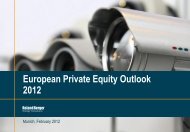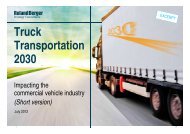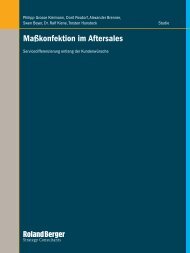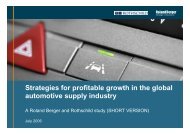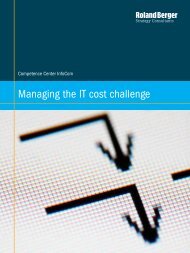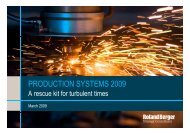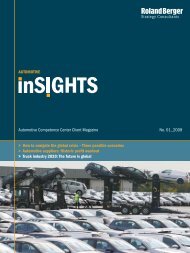Powertrain 2020 - The Future Drives Electric (PDF ... - Roland Berger
Powertrain 2020 - The Future Drives Electric (PDF ... - Roland Berger
Powertrain 2020 - The Future Drives Electric (PDF ... - Roland Berger
You also want an ePaper? Increase the reach of your titles
YUMPU automatically turns print PDFs into web optimized ePapers that Google loves.
24 |<br />
Study<br />
Full hybrid powertrains are not the most cost-efficient way to enhance fuel<br />
efficiency. <strong>The</strong>y will therefore remain a niche technology, at least in markets<br />
with a high share of diesel. We foresee a trend toward developing full hybrids<br />
into PHEVs (see section 2.2), owing to the significant extra potential<br />
for reducing CO 2 and limited extra costs for a slightly larger battery.<br />
If automakers apply the technologies described above in advanced gasoline<br />
powertrains, they can potentially achieve savings of more than 40% compared<br />
to standard powertrains with a naturally aspirated, four-valve port<br />
injection engine.<br />
<strong>The</strong> first step in this process would be to make a number of smaller enhancements,<br />
such as reduced engine friction through optimized bearing,<br />
an integrated exhaust manifold, a cooling system with an adjustable water<br />
pump, optimized gearbox ratios and so on. This would lower CO 2 emissions<br />
by up to 9%.<br />
<strong>Future</strong> best-in-class gasoline engines will be significantly downsized, with<br />
much less displacement and fewer cylinders than today's engines. <strong>The</strong>y will<br />
feature direct injection and a variable valve train, and will be supported by<br />
a micro-hybrid or mild hybrid powertrain.




